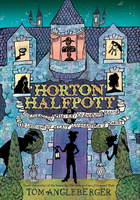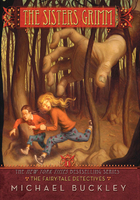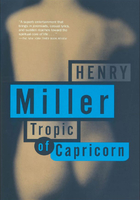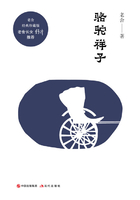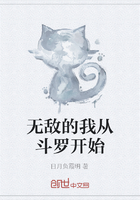A green hunting cap squeezed the top of the fleshy balloon of a head. The green earflaps, full of large ears and uncut hair and the fine bristles that grew in the ears themselves, stuck out on either side like turn signals indicating two directions at once. Full, pursed lips protruded beneath the bushy black moustache and, at their corners, sank into little folds filled with disapproval and potato chip crumbs. In the shadow under the green visor of the cap Ignatius J. Reilly's supercilious blue and yellow eyes looked down upon the other people waiting under the clock at the D. H. Holmes department store, studying the crowd of people for signs of bad taste in dress. Several of the outfits, Ignatius noticed, were new enough and expensive enough to be properly considered offenses against taste and decency. Possession of anything new or expensive only reflected a person's lack of theology and geometry; it could even cast doubts upon one's soul.
Ignatius himself was dressed comfortably and sensibly. The hunting cap prevented head colds. The voluminous tweed trousers were durable and permitted unusually free locomotion. Their pleats and nooks contained pockets of warm, stale air that soothed Ignatius. The plaid flannel shirt made a jacket unnecessary while the muffler guarded exposed Reilly skin between earflap and collar. The outfit was acceptable by any theological and geometrical standards, however abstruse, and suggested a rich inner life.
Shifting from one hip to the other in his lumbering, elephantine fashion, Ignatius sent waves of flesh rippling beneath the tweed and flannel, waves that broke upon buttons and seams. Thus rearranged, he contemplated the long while that he had been waiting for his mother. Principally he considered the discomfort he was beginning to feel. It seemed as if his whole being was ready to burst from his swollen suede desert boots, and, as if to verify this, Ignatius turned his singular eyes toward his feet. The feet did indeed look swollen. He was prepared to offer the sight of those bulging boots to his mother as evidence of her thoughtlessness. Looking up, he saw the sun beginning to descend over the Mississippi at the foot of Canal Street. The Holmes clock said almost five. Already he was polishing a few carefully worded accusations designed to reduce his mother to repentance or, at least, confusion. He often had to keep her in her place.
She had driven him downtown in the old Plymouth, and while she was at the doctor's seeing about her arthritis, Ignatius had bought some sheet music at Werlein's for his trumpet and a new string for his lute. Then he had wandered into the Penny Arcade on Royal Street to see whether any new games had been installed. He had been disappointed to find the miniature mechanical baseball game gone. Perhaps it was only being repaired. The last time that he had played it the batter would not work and, after some argument, the management had returned his nickel, even though the Penny Arcade people had been base enough to suggest that Ignatius had himself broken the baseball machine by kicking it.
Concentrating upon the fate of the miniature baseball machine, Ignatius detached his being from the physical reality of Canal Street and the people around him and therefore did not notice the two eyes that were hungrily watching him from behind one of D. H. Holmes' pillars, two sad eyes shining with hope and desire.
Was it possible to repair the machine in New Orleans? Probably so. However, it might have to be sent to someplace like Milwaukee or Chicago or some other city whose name Ignatius associated with efficient repair shops and permanently smoking factories. Ignatius hoped that the baseball game was being carefully handled in shipment, that none of its little players was being chipped or maimed by brutal railroad employees determined to ruin the railroad forever with damage claims from shippers, railroad employees who would subsequently go on strike and destroy the Illinois Central.
As Ignatius was considering the delight which the little baseball game afforded humanity, the two sad and covetous eyes moved toward him through the crowd like torpedoes zeroing in on a great woolly tanker. The policeman plucked at Ignatius' bag of sheet music.
"You got any identification, mister?" the policeman asked in a voice that hoped that Ignatius was officially unidentified.
"What?" Ignatius looked down upon the badge on the blue cap. "Who are you?"
"Let me see your driver's license."
"I don't drive. Will you kindly go away? I am waiting for my mother."
"What's this hanging out your bag?"
"What do you think it is, stupid? It's a string for my lute."
"What's that?" The policeman drew back a little. "Are you local?"
"Is it the part of the police department to harass me when this city is a flagrant vice capital of the civilized world?" Ignatius bellowed over the crowd in front of the store. "This city is famous for its gamblers, prostitutes, exhibitionists, Antichrists, alcoholics, sodomites, drug addicts, fetishists, onanists, pornographers, frauds, jades, litterbugs, and lesbians, all of whom are only too well protected by graft. If you have a moment, I shall endeavor to discuss the crime problem with you, but don't make the mistake of bothering me."
The policeman grabbed Ignatius by the arm and was struck on his cap with the sheet music. The dangling lute string whipped him on the ear.
"Hey," the policeman said.
"Take that!" Ignatius cried, noticing that a circle of interested shoppers was beginning to form.
Inside D. H. Holmes, Mrs. Reilly was in the bakery department pressing her maternal breast against a glass case of macaroons. With one of her fingers, chafed from many years of scrubbing her son's mammoth, yellowed drawers, she tapped on the glass case to attract the saleslady.
"Oh, Miss Inez," Mrs. Reilly called in that accent that occurs south of New Jersey only in New Orleans, that Hoboken near the Gulf of Mexico. "Over here, babe."
"Hey, how you making?" Miss Inez asked. "How you feeling, darling?"
"Not so hot," Mrs. Reilly answered truthfully.
"Ain't that a shame." Miss Inez leaned over the glass case and forgot about her cakes. "I don't feel so hot myself. It's my feet."
"Lord, I wisht I was that lucky. I got arthuritis in my elbow."
"Aw, no!" Miss Inez said with genuine sympathy. "My poor old poppa's got that. We make him go set himself in a hot tub fulla berling water."
"My boy's floating around in our tub all day long. I can't hardly get in my own bathroom no more."
"I thought he was married, precious."
"Ignatius? Eh, la la," Mrs. Reilly said sadly. "Sweetheart, you wanna gimme two dozen of them fancy mix?"
"But I thought you told me he was married," Miss Inez said while she was putting the cakes in a box.
"He ain't even got him a prospect. The little girlfriend he had flew the coop."
"Well, he's got time."
"I guess so," Mrs. Reilly said disinterestedly. "Look, you wanna gimme half a dozen wine cakes, too? Ignatius gets nasty if we run outta cake."
"Your boy likes his cake, huh?"
"Oh, Lord, my elbow's killing me," Mrs. Reilly answered.
In the center of the crowd that had formed before the department store the hunting cap, the green radius of the circle of people, was bobbing about violently.
"I shall contact the mayor," Ignatius was shouting.
"Let the boy alone," a voice said from the crowd.
"Go get the strippers on Bourbon Street," an old man added. "He's a good boy. He's waiting for his momma."
"Thank you," Ignatius said haughtily. "I hope that all of you will bear witness to this outrage."
"You come with me," the policeman said to Ignatius with waning self-confidence. The crowd was turning into something of a mob, and there was no traffic patrolman in sight. "We're going to the precinct."
"A good boy can't even wait for his momma by D. H. Holmes." It was the old man again. "I'm telling you, the city was never like this. It's the communiss."
"Are you calling me a communiss?" the policeman asked the old man while he tried to avoid the lashing of the lute string. "I'll take you in, too. You better watch out who you calling a communiss."
"You can't arress me," the old man cried. "I'm a member of the Golden Age Club sponsored by the New Orleans Recreation Department."
"Let that old man alone, you dirty cop," a woman screamed. "He's prolly somebody's grampaw."
"I am," the old man said. "I got six granchirren all studying with the sisters. Smart, too."
Over the heads of the people Ignatius saw his mother walking slowly out of the lobby of the department store carrying the bakery products as if they were boxes of cement.
"Mother!" he called. "Not a moment too soon. I've been seized."
Pushing through the people, Mrs. Reilly said, "Ignatius! What's going on here? What you done now? Hey, take your hands off my boy."
"I'm not touching him, lady," the policeman said. "Is this here your son?"
Mrs. Reilly snatched the whizzing lute string from Ignatius.
"Of course I'm her child," Ignatius said. "Can't you see her affection for me?"
"She loves her boy," the old man said.
"What you trying to do my poor child?" Mrs. Reilly asked the policeman. Ignatius patted his mother's hennaed hair with one of his huge paws. "You got plenty business picking on poor chirren with all the kind of people they got running in this town. Waiting for his momma and they try to arrest him."
"This is clearly a case for the Civil Liberties Union," Ignatius observed, squeezing his mother's drooping shoulder with the paw. "We must contact Myrna Minkoff, my lost love. She knows about those things."
"It's the communiss," the old man interrupted.
"How old is he?" the policeman asked Mrs. Reilly.
"I am thirty," Ignatius said condescendingly.
"You got a job?"
"Ignatius hasta help me at home," Mrs. Reilly said. Her initial courage was failing a little, and she began to twist the lute string with the cord on the cake boxes. "I got terrible arthuritis."
"I dust a bit," Ignatius told the policeman. "In addition, I am at the moment writing a lengthy indictment against our century. When my brain begins to reel from my literary labors, I make an occasional cheese dip."
"Ignatius makes delicious cheese dips," Mrs. Reilly said.
"That's very nice of him," the old man said. "Most boys are out running around all the time."
"Why don't you shut up?" the policeman said to the old man.
"Ignatius," Mrs. Reilly asked in a trembling voice, "what you done, boy?"
"Actually, Mother, I believe that it was he who started everything." Ignatius pointed to the old man with his bag of sheet music. "I was simply standing about, waiting for you, praying that the news from the doctor would be encouraging."
"Get that old man outta here," Mrs. Reilly said to the policeman. "He's making trouble. It's a shame they got people like him walking the streets."
"The police are all communiss," the old man said.
"Didn't I say for you to shut up?" the policeman said angrily.
"I fall on my knees every night to thank my God we got protection," Mrs. Reilly told the crowd. "We'd all be dead without the police. We'd all be laying in our beds with our throats cut open from ear to ear."
"That's the truth, girl," some woman answered from the crowd.
"Say a rosary for the police force." Mrs. Reilly was now addressing her remarks to the crowd. Ignatius caressed her shoulder wildly, whispering encouragement. "Would you say a rosary for a communiss?"
"No!" several voices answered fervently. Someone pushed the old man.
"It's true, lady," the old man cried. "He tried to arrest your boy. Just like in Russia. They're all communiss."
"Come on," the policeman said to the old man. He grabbed him roughly by the back of the coat.
"Oh, my God!" Ignatius said, watching the wan little policeman try to control the old man. "Now my nerves are totally frayed."
"Help!" the old man appealed to the crowd. "It's a takeover. It's a violation of the Constitution!"
"He's crazy, Ignatius," Mrs. Reilly said. "We better get outta here, baby." She turned to the crowd. "Run, folks. He might kill us all. Personally, I think maybe he's the communiss."
"You don't have to overdo it, Mother," Ignatius said as they pushed through the dispersing crowd and started walking rapidly down Canal Street. He looked back and saw the old man and the bantam policeman grappling beneath the department store clock. "Will you please slow down a bit? I think I'm having a heart murmur."
"Oh, shut up. How you think I feel? I shouldn't haveta be running like this at my age."
"The heart is important at any age, I'm afraid."
"They's nothing wrong with your heart."
"There will be if we don't go a little slower." The tweed trousers billowed around Ignatius' gargantuan rump as he rolled forward. "Do you have my lute string?"
Mrs. Reilly pulled him around the corner onto Bourbon Street, and they started walking down into the French Quarter.
"How come that policeman was after you, boy?"
"I shall never know. But he will probably be coming after us in a few moments, as soon as he has subdued that aged fascist."
"You think so?" Mrs. Reilly asked nervously.
"I would imagine so. He seemed determined to arrest me. He must have some sort of quota or something. I seriously doubt that he will permit me to elude him so easily."
"Wouldn't that be awful! You'd be all over the papers, Ignatius. The disgrace! You musta done something while you was waiting for me, Ignatius. I know you, boy."
"If anyone was ever minding his business, it was I," Ignatius breathed. "Please. We must stop. I think I'm going to have a hemorrhage."
"Okay." Mrs. Reilly looked at her son's reddening face and realized that he would very happily collapse at her feet just to prove his point. He had done it before. The last time that she had forced him to accompany her to mass on Sunday he had collapsed twice on the way to the church and had collapsed once again during the sermon about sloth, reeling out of the pew and creating an embarrassing disturbance. "Let's go in here and sit down."
She pushed him through the door of the Night of Joy bar with one of the cake boxes. In the darkness that smelled of bourbon and cigarette butts they climbed onto two stools. While Mrs. Reilly arranged her cake boxes on the bar, Ignatius spread his expansive nostrils and said, "My God, Mother, it smells awful. My stomach is beginning to churn."
"You wanna go back on the street? You want that policeman to take you in?"
Ignatius did not answer; he was sniffing loudly and making faces. A bartender, who had been observing the two, asked quizzically from the shadows, "Yes?"
"I shall have a coffee," Ignatius said grandly. "Chicory coffee with boiled milk."
"Only instant," the bartender said.
"I can't possibly drink that," Ignatius told his mother. "It's an abomination."
"Well, get a beer, Ignatius. It won't kill you."
"I may bloat."
"I'll take a Dixie 45," Mrs. Reilly said to the bartender.
"And the gentleman?" the bartender asked in a rich, assumed voice. "What is his pleasure?"
"Give him a Dixie, too."
"I may not drink it," Ignatius said as the bartender went off to open the beers.
"We can't sit in here for free, Ignatius."
"I don't see why not. We're the only customers. They should be glad to have us."
"They got strippers in here at night, huh?" Mrs. Reilly nudged her son.
"I would imagine so," Ignatius said coldly. He looked quite pained. "We might have stopped somewhere else. I suspect that the police will raid this place momentarily anyway." He snorted loudly and cleared his throat. "Thank God my moustache filters out some of the stench. My olfactories are already beginning to send out distress signals."
After what seemed a long time, during which there was much tinkling of glass and closing of coolers somewhere in the shadows, the bartender appeared again and set the beers before them, pretending to knock Ignatius' beer into his lap. The Reillys were getting the Night of Joy's worst service, the treatment given unwanted customers.
"You don't by any chance have a cold Dr. Nut, do you?" Ignatius asked.
"No."
"My son loves Dr. Nut," Mrs. Reilly explained. "I gotta buy it by the case. Sometimes he sits himself down and drinks two, three Dr. Nuts at one time."
"I am sure that this man is not particularly interested," Ignatius said.
"Like to take that cap off?" the bartender asked.
"No, I wouldn't!" Ignatius thundered. "There's a chill in here."
"Suit yourself," the bartender said and drifted off into the shadows at the other end of the bar.
"Really!"
"Calm down," his mother said.
Ignatius raised the earflap on the side next to his mother.
"Well, I will lift this so that you won't have to strain your voice. What did the doctor tell you about your elbow or whatever it is?"
"It's gotta be massaged."
"I hope you don't want me to do that. You know how I feel about touching other people,"
"He told me to stay out the cold as much as possible."
"If I could drive, I would be able to help you more, I imagine."
"Aw, that's okay, honey."
"Actually, even riding in a car affects me enough. Of course, the worst thing is riding on top in one of those Greyhound Scenicruisers. So high up. Do you remember the time that I went to Baton Rouge in one of those? I vomited several times. The driver had to stop the bus somewhere in the swamps to let me get off and walk around for a while. The other passengers were rather angry. They must have had stomachs of iron to ride in that awful machine. Leaving New Orleans also frightened me considerably. Outside of the city limits the heart of darkness, the true wasteland begins."
"I remember that, Ignatius," Mrs. Reilly said absently, drinking her beer in gulps. "You was really sick when you got back home."
"I felt better then. The worst moment was my arrival in Baton Rouge. I realized that I had a round-trip ticket and would have to return on the bus."
"You told me that, babe."
"The taxi back to New Orleans cost me forty dollars, but at least I wasn't violently ill during the taxi ride, although I felt myself beginning to gag several times. I made the driver go very slowly, which was unfortunate for him. The state police stopped him twice for being below the minimum highway speed limit. On the third time that they stopped him they took away his chauffeur's license. You see, they had been watching us on the radar all along."
Mrs. Reilly's attention wavered between her son and the beer. She had been listening to the story for three years.
"Of course," Ignatius continued, mistaking his mother's rapt look for interest, "that was the only time that I had ever been out of New Orleans in my life. I think that perhaps it was the lack of a center of orientation that might have upset me. Speeding along in that bus was like hurtling into the abyss. By the time we had left the swamps and reached those rolling hills near Baton Rouge, I was getting afraid that some rural rednecks might toss bombs at the bus. They love to attack vehicles, which are a symbol of progress, I guess."
"Well, I'm glad you didn't take the job," Mrs. Reilly said automatically, taking guess as her cue.
"I couldn't possibly take the job. When I saw the chairman of the Medieval Culture Department, my hands began breaking out in small white bumps. He was a totally soulless man. Then he made a comment about my not wearing a tie and made some smirky remark about the lumber jacket. I was appalled that so meaningless a person would dare such effrontery. That lumber jacket was one of the few creature comforts to which I've ever been really attached, and if I ever find the lunatic who stole it, I shall report him to the proper authorities."
Mrs. Reilly saw again the horrible, coffee-stained lumber jacket that she had always secretly wanted to give to the Volunteers of America along with several other pieces of Ignatius' favorite clothing.
"You see, I was so overwhelmed by the complete grossness of that spurious 'chairman' that I ran from his office in the middle of one of his cretinous ramblings and rushed to the nearest bathroom, which turned out to be the one for 'Faculty Men.' At any rate, I was seated in one of the booths, having rested the lumber jacket on top of the door of the booth. Suddenly I saw the jacket being whisked over the door. I heard footsteps. Then the door of the rest room closed. At the moment, I was unable to pursue the shameless thief, so I began to scream. Someone entered the bathroom and knocked at the door of the booth. It turned out to be a member of the campus security force, or so he said. Through the door I explained what had just happened. He promised to find the jacket and went away. Actually, as I have mentioned to you before, I have always suspected that he and the 'chairman' were the same person. Their voices sounded somewhat similar."
"You sure can't trust nobody nowadays, honey."
"As soon as I could, I fled from the bathroom, eager only to get away from that horrible place. Of course, I was almost frozen standing on that desolate campus trying to hail a taxi. I finally got one that agreed to take me to New Orleans for forty dollars, and the driver was selfless enough to lend me his jacket. By the time we arrived here, however, he was quite depressed about losing his license and had grown rather surly. He also appeared to be developing a bad cold, judging by the frequency of his sneezes. After all, we were on the highway for almost two hours."
"I think I could drink me another beer, Ignatius."
"Mother! In this forsaken place?"
"Just one, baby. Come on, I want another."
"We're probably catching something from these glasses. However, if you're quite determined about the thing, get me a brandy, will you?"
Mrs. Reilly signaled to the bartender, who came out of the shadows and asked, "Now what happened to you on that bus, bud? I didn't get the end of the story."
"Will you kindly tend the bar properly?" Ignatius asked furiously. "It is your duty to silently serve when we call upon you. If we had wished to include you in our conversation, we would have indicated it by now. As a matter of fact, we are discussing rather urgent personal matters."
"The man's just trying to be nice, Ignatius. Shame on you."
"That in itself is a contradiction in terms. No one could possibly be nice in a den like this."
"We want two more beers."
"One beer and one brandy," Ignatius corrected.
"No more clean glasses," the bartender said.
"Ain't that a shame," Mrs. Reilly said. "Well, we can use the ones we got."
The bartender shrugged and went off into the shadows.
II
In the precinct the old man sat on a bench with the others, mostly shoplifters, who composed the late afternoon haul. He had neatly arranged along his thigh his Social Security card, his membership card in the St. Odo of Cluny Holy Name Society, a Golden Age Club badge, and a slip of paper identifying him as a member of the American Legion. A young black man, eyeless behind space-age sunglasses, studied the little dossier on the thigh next to his.
"Whoa!" he said, grinning. "Say, you mus belong to everthin."
The old man rearranged his cards meticulously and said nothing.
"How come they draggin in somebody like you?" The sunglasses blew smoke all over the old man's cards. "Them police mus be gettin desperate."
"I'm here in violation of my constitutional rights," the old man said with sudden anger.
"Well, they not gonna believe that. You better think up somethin else." A dark hand reached for one of the cards. "Hey, wha this mean, 'Colder Age'?"
The old man snatched the card and put it back on his thigh.
"Them little card not gonna do you no good. They throw you in jail anyway. They throw everbody in jail."
"You think so?" the old man asked the cloud of smoke.
"Sure." A new cloud floated up. "How come you here, man?"
"I don't know."
"You don know? Whoa! That crazy. You gotta be here for somethin. Plenty time they pickin up color peoples for nothin, but, mister, you gotta be here for somethin."
"I really don't know," the old man said glumly. "I was just standing in a crowd in front of D. H. Holmes."
"And you lif somebody wallet."
"No, I called a policeman a name."
"Like wha you callin him?"
"'Communiss.'"
"Cawmniss! Ooo-woo. If I call a police a cawmniss, my ass be in Angola right now for sure. I like to call one of them mother a cawmniss, though. Like this afternoon I standin aroun in Woolsworth and some cat steal a bag of cashew nuts out the 'Nut House' star screamin like she been stab. Hey! The nex thing, a flo'walk grabbin me, and then a police mother draggin me off. A man ain got a chance. Whoa!" His lips sucked at the cigarette. "Nobody findin them cashews on me, but that police still draggin me off. I think that flo'walk a cawmniss. Mean motherfucker."
The old man cleared his throat and played with his cards.
"They probly let you go," the sunglasses said. "Me, they probly gimma a little talk think it scare me, even though they know I ain got them cashews. They probly try to prove I got them nuts. They probly buy a bag, slip it in my pocket. Woolsworth probly try to send me up for life."
The Negro seemed quite resigned and blew out a new cloud of blue smoke that enveloped him and the old man and the little cards. Then he said to himself, "I wonder who lif them nuts. Probly that flo'walk hisself."
A policeman summoned the old man up to the desk in the center of the room where a sergeant was seated. The patrolman who had arrested him was standing there.
"What's your name?" the sergeant asked the old man.
"Claude Robichaux," he answered and put his little cards on the desk before the sergeant.
The sergeant looked over the cards and said, "Patrolman Mancuso here says you resisted arrest and called him a communiss."
"I didn't mean it," the old man said sadly, noticing how fiercely the sergeant was handling the little cards.
"Mancuso says you says all policemen are communiss."
"Oo-wee," the Negro said across the room.
"Will you shut up, Jones?" the sergeant called out.
"Okay," Jones answered.
"I'll get to you next."
"Say, I didn call nobody no cawmniss," Jones said. "I been frame by that flo'walk in Woolsworth. I don even like cashews."
"Shut your mouth up."
"Okay," Jones said brightly and blew a great thundercloud of smoke.
"I didn't mean anything I said," Mr. Robichaux told the sergeant. "I just got nervous. I got carried away. This policeman was trying to arress a poor boy waiting for his momma by Holmes."
"What?" The sergeant turned to the wan little policeman. "What were you trying to do?"
"He wasn't a boy," Mancuso said. "He was a big fat man dressed funny. He looked like a suspicious character. I was just trying to make a routine check and he started to resist. To tell you the truth, he looked like a big prevert."
"A pervert, huh?" the sergeant asked greedily.
"Yes," Mancuso said with new confidence. "A great big prevert."
"How big?"
"The biggest I ever saw in my whole life," Mancuso said, stretching his arms as if he were describing a fishing catch. The sergeant's eyes shone. "The first thing I spotted was this green hunting cap he was wearing."
Jones listened in attentive detachment somewhere within his cloud.
"Well, what happened, Mancuso? How come he's not standing here before me?"
"He got away. This woman came out the store and got everything mixed up, and she and him run around the corner into the Quarter."
"Oh, two Quarter characters," the sergeant said, suddenly enlightened.
"No, sir," the old man interrupted. "She was really his momma. A nice, pretty lady. I seen them downtown before. This policeman frightened her."
"Oh, listen, Mancuso," the sergeant screamed. "You're the only guy on the force who'd try to arrest somebody away from his mother. And why did you bring in grampaw here? Ring up his family and tell them to come get him."
"Please," Mr. Robichaux pleaded. "Don't do that. My daughter's busy with her kids. I never been arrested in my whole life. She can't come get me. What are my granchirren gonna think? They're all studying with the sisters."
"Get his daughter's number, Mancuso. That'll teach him to call us communiss!"
"Please!" Mr. Robichaux was in tears. "My granchirren respect me."
"Jesus Christ!" the sergeant said. "Trying to arrest a kid with his momma, bringing in somebody's grampaw. Get the hell outta here, Mancuso, and take grampaw with you. You wanna arrest suspicious characters? We'll fix you up."
"Yes, sir," Mancuso said weakly, leading the weeping old man away.
"Ooo-wee!" Jones said from the secrecy of his cloud.
III
Twilight was settling around the Night of Joy bar. Outside, Bourbon Street was beginning to light up. Neon signs flashed off and on, reflecting in the streets dampened by the light mist that had been falling steadily for some time. The taxis bringing the evening's first customers, Midwestern tourists and conventioneers, made slight splashing sounds in the cold dusk.
A few other customers were in the Night of Joy, a man who ran his finger along a racing form, a depressed blonde who seemed connected with the bar in some capacity, and an elegantly dressed young man who chain-smoked Salems and drank frozen daiquiris in gulps.
"Ignatius, we better go," Mrs. Reilly said and belched.
"What?" Ignatius bellowed. "We must stay to watch the corruption. It's already beginning to set in."
The elegant young man spilled his daiquiri on his bottle-green velvet jacket.
"Hey, bartender," Mrs. Reilly called. "Get a rag. One of the customers just spilled they drink."
"That's quite all right, darling," the young man said angrily. He arched an eyebrow at Ignatius and his mother. "I think I'm in the wrong bar anyway."
"Don't get upset, honey," Mrs. Reilly counseled. "What's that you drinking? It looks like a pineapple snowball."
"Even if I described it to you, I doubt whether you'd understand what it is."
"How dare you talk to my dear, beloved mother like that!"
"Oh, hush, you big thing," the young man snapped. "Just look at my jacket."
"It's totally grotesque."
"Okay, now. Let's be friends," Mrs. Reilly said through foamy lips. "We got enough bombs and things already."
"And your son seems to delight in dropping them, I must say."
"Okay, you two. This is the kinda place where everybody oughta have themselves some fun." Mrs. Reilly smiled at the young man. "Let me buy you another drink, babe, for the one you spilled. And I think I'll take me another Dixie."
"I really must run," the young man sighed. "Thanks anyway."
"On a night like this?" Mrs. Reilly asked. "Aw, don't pay no mind to what Ignatius says. Why don't you stay and see the show?"
The young man rolled his eyes heavenward.
"Yeah." The blonde broke her silence. "See some ass and tits."
"Mother," Ignatius said coldly. "I do believe that you are encouraging these preposterous people."
"Well, you're the one wanted to stay, Ignatius."
"Yes, I did want to stay as an observer. I am not especially anxious to mingle."
"Honey, to tell you the truth, I can't listen to that story about that bus no more tonight. You already told it four times since we got here."
Ignatius looked hurt.
"I hardly suspected that I was boring you. After all, that bus ride was one of the more formative experiences of my life. As a mother, you should be interested in the traumas that have created my worldview."
"What's with the bus?" the blonde asked, moving to the stool next to Ignatius. "My name's Darlene. I like good stories. You got a spicy one?"
The bartender slammed the beer and the daiquiri down just as the bus was starting off on its journey in the vortex.
"Here, have a clean glass," the bartender snarled at Mrs. Reilly.
"Ain't that nice. Hey, Ignatius, I just got a clean glass."
But her son was too preoccupied with his arrival in Baton Rouge to hear her.
"You know, sweetheart," Mrs. Reilly said to the young man, "me and my boy was in trouble today. The police tried to arress him."
"Oh, my dear. Policemen are always so adamant, aren't they?"
"Yeah, and Ignatius got him a master's degree and all."
"What in the world was he doing?"
"Nothing. Just standing waiting for his poor, dear momma."
"His outfit is a little bizarre. I thought he was a performer of some sort when I first came in, although I tried not to imagine the nature of his act."
"I keep on telling him about his clothes, but he won't listen." Mrs. Reilly looked at the back of her son's flannel shirt and at the hair curling down the back of his neck. "That's sure pretty, that jacket you got."
"Oh, this?" the young man asked, feeling the velvet on the sleeve. "I don't mind telling you it cost a fortune. I found it in a dear little shop in the Village."
"You don't look like you from the country."
"Oh, my," the young man sighed and lit a Salem with a great click of his lighter. "I meant Greenwich Village in New York, sweetie. By the way, where did you ever get that hat? It's truly fantastic."
"Aw, Lord, I had this since Ignatius made his First Communion."
"Would you consider selling it?"
"How come?"
"I'm a dealer in used clothing. I'll give you ten dollars for it."
"Aw, come on. For this?"
"Fifteen?"
"Really?" Mrs. Reilly removed the hat. "Sure, honey."
The young man opened his wallet and gave Mrs. Reilly three five-dollar bills. Draining his daiquiri glass, he stood up and said, "Now I really must run."
"So soon?"
"It's been perfectly delightful meeting you."
"Take care out in the cold and wet."
The young man smiled, placed the hat carefully beneath his trench coat, and left the bar.
"The radar patrol," Ignatius was telling Darlene, "is obviously rather foolproof. It seems that the cabdriver and I were making small dots on their screen all the way from Baton Rouge."
"You was on radar," Darlene yawned. "Just think of that."
"Ignatius, we gotta go now," Mrs. Reilly said. "I'm hungry."
She turned toward him and knocked her beer bottle to the floor, where it broke into a spray of brown, jagged glass.
"Mother, are you making a scene?" Ignatius asked irritably. "Can't you see that Miss Darlene and I are speaking? You have some cakes with you. Eat those. You're always complaining that you never go anywhere. I would have imagined that you would be enjoying your night on the town."
Ignatius was back on radar, so Mrs. Reilly reached in her boxes and ate a brownie.
"Like one?" she asked the bartender. "They nice. I got some nice wine cakes, too."
The bartender pretended to be looking for something on his shelves.
"I smell wine cakes," Darlene cried, looking past Ignatius.
"Have one, honey," Mrs. Reilly said.
"I think that I shall have one, too," Ignatius said. "I imagine that they taste rather good with brandy."
Mrs. Reilly spread the box out on the bar. Even the man with the racing form agreed to take a macaroon.
"Where you bought these nice wine cakes, lady?" Darlene asked Mrs. Reilly. "They're nice and juicy."
"Over by Holmes, sugar. They got a good selection. Plenty variety."
"They are rather tasty," Ignatius conceded, sending out his flabby pink tongue over his moustache to hunt for crumbs. "I think that I shall have a macaroon or two. I have always found coconut to be good roughage."
He picked around in the box purposefully.
"Me, I always like some good cake after I finish eating," Mrs. Reilly told the bartender, who turned his back on her.
"I bet you cook good, huh?" Darlene asked.
"Mother doesn't cook," Ignatius said dogmatically. "She burns."
"I use to cook too when I was married," Darlene told them. "I sort of used a lot of that canned stuff, though. I like that Spanish rice they got and that spaghetti with the tomato gravy."
"Canned food is a perversion," Ignatius said. "I suspect that it is ultimately very damaging to the soul."
"Lord, my elbow's starting up again," Mrs. Reilly sighed.
"Please. I am speaking," her son told her. "I never eat canned food. I did once, and I could feel my intestines starting to atrophy."
"You got a good education," Darlene said.
"Ignatius graduated from college. Then he stuck around there for four more years to get him a master's degree. Ignatius graduated smart."
"Graduated smart," Ignatius repeated with some pique. "Please define your terms. Exactly what do you mean by 'graduated smart'?"
"Don't talk to your momma like that," Darlene said.
"Oh, he treats me bad sometimes," Mrs. Reilly said loudly and began to cry. "You just don't know. When I think of all I done for that boy…"
"Mother, what are you saying?"
"You don't appreciate me."
"Stop that right now. I'm afraid that you've had too much beer."
"You treat me like garbage. I been good," Mrs. Reilly sobbed. She turned to Darlene. "I spent all his poor Grammaw Reilly's insurance money to keep him in college for eight years, and since then all he's done is lay around the house watching television."
"You oughta be ashamed," Darlene said to Ignatius. "A big man like you. Look at your poor momma."
Mrs. Reilly had collapsed, sobbing, on the bar, one hand clenched around her beer glass.
"This is ridiculous. Mother, stop that."
"If I knew you was so crool, mister, I wouldna listened to your crazy story about that Greyhound bus."
"Get up, Mother."
"You look like a big crazy man anyway," Darlene said. "I shoulda known. Just look how that poor woman's crying."
Darlene tried to push Ignatius from his stool but sent him crashing into his mother, who suddenly stopped crying and gasped, "My elbow!"
"What's going on here?" a woman asked from the padded chartreuse leatherette door of the bar. She was a statuesque woman nearing middle age, her fine body covered with a black leather overcoat that glistened with mist. "I leave this place for a few hours to go shopping and look what happens. I gotta be here every minute, I guess, to watch out you people don't ruin my investment."
"Just two drunks," the bartender said. "I've been giving them the cold shoulder since they come in, but they've been sticking like flies."
"But you, Darlene," the woman said. "You're big friends with them, huh? Playing games on the stools with these two characters?"
"This guy's been mistreating his momma," Darlene explained.
"Mothers? We got mothers in here now? Business already stinks."
"I beg your pardon," Ignatius said.
The woman ignored him and looked at the broken and empty cake box on the bar, saying, "Somebody's been having a picnic in here. Goddammit. I already told you people about ants and rats."
"I beg your pardon," Ignatius said again. "My mother is present."
"It's just my luck to have this crap broken all over here just when I'm looking for a janitor." The woman looked at the bartender. "Get these two out."
"Yes, Miss Lee."
"Don't you worry," Mrs. Reilly said. "We're leaving."
"We certainly are," Ignatius added, lumbering toward the door, leaving his mother behind to climb off her stool. "Hurry along, Mother. This woman looks like a Nazi commandant. She may strike us."
"Wait!" Miss Lee screamed, grabbing Ignatius' sleeve. "How much these characters owe?"
"Eight dollars," the bartender said.
"This is highway robbery!" Ignatius thundered. "You will hear from our attorneys."
Mrs. Reilly paid with two of the bills the young man had given her and, as she swayed past Miss Lee, she said, "We know when we not wanted. We can take our trade elsewheres."
"Good," Miss Lee answered. "Beat it. Trade from people like you is the kiss of death."
After the padded door had closed behind the Reillys, Miss Lee said, "I never liked mothers. Not even my own."
"My mother was a whore," the man with the racing form said, not looking up from his paper.
"Mothers are full of shit," Miss Lee observed and took off her leather coat. "Now let's you and me have a little talk, Darlene."
Outside, Mrs. Reilly took her son's arm for support, but, as much as they tried, they moved forward very slowly, although they seemed to move sideward more easily. Their walking had developed a pattern: three quick steps to the left, pause, three quick steps to the right, pause.
"That was a terrible woman," Mrs. Reilly said.
"A negation of all human qualities," Ignatius added. "By the way, how far is the car? I'm very tired."
"On St. Ann, honey. Just a few blocks."
"You left your hat in the bar."
"Oh, I sold it to that young man."
"You sold it? Why? Did you ask me whether I wanted it to be sold? I was very attached to that hat."
"I'm sorry, Ignatius. I didn't know you liked it so much. You never said nothing about it."
"I had an unspoken attachment to it. It was a contact with my childhood, a link with the past."
"But he gave me fifteen dollars, Ignatius."
"Please. Don't talk about it anymore. The whole business is sacrilegious. Goodness knows what degenerate uses he will find for that hat. Do you have the fifteen dollars on you?"
"I still got seven left."
"Then why don't we stop and eat something?" Ignatius pointed to the cart at the corner. It was shaped like a hot dog on wheels. "I believe that they vend foot-long hot dogs."
"Hot dogs? Honey, in all this rain and cold we gonna stand outside and eat weenies?"
"It's a thought."
"No," Mrs. Reilly said with somewhat beery courage. "Let's get home. I wouldn't eat nothing outta one of them dirty wagons anyway. They all operated by a bunch of bums."
"If you insist," Ignatius said, pouting. "Although I am rather hungry, and you have, after all, just sold a memento of my childhood for thirty pieces of silver, so to speak."
They continued their little pattern of steps along the wet flagstones of Bourbon Street. On St. Ann they found the old Plymouth easily. Its high roof stood above all the other cars, its best feature. The Plymouth was always easy to find in supermarket parking lots. Mrs. Reilly climbed the curb twice trying to force the car out of the parking place and left the impression of a 1946 Plymouth bumper in the hood of the Volkswagen in the rear.
"My nerves!" Ignatius said. He was slumped down in the seat so that just the top of his green hunting cap appeared in the window, looking like the tip of a promising watermelon. From the rear, where he always sat, having read somewhere that the seat next to the driver was the most dangerous, he watched his mother's wild and inexpert shifting with disapproval. "I suspect that you have effectively demolished the small car that someone innocently parked behind this bus. You had better succeed in getting out of this spot before its owner happens along."
"Shut up, Ignatius. You making me nervous," Mrs. Reilly said, looking at the hunting cap in the rearview mirror.
Ignatius got up on the seat and looked out of the rear window.
"That car is a total wreck. Your driver's license, if you do indeed have one, will doubtlessly be revoked. I certainly wouldn't blame them."
"Lay down there and take a nap," his mother said as the car jerked back again.
"Do you think that I could sleep now? I'm afraid for my life. Are you sure that you're turning the wheel the right way?"
Suddenly the car leaped out of the parking spot and skidded across the wet street into a post supporting a wrought-iron balcony. The post fell away to one side, and the Plymouth crunched against the building.
"Oh, my God!" Ignatius screamed from the rear. "What have you done now?"
"Call a priest!"
"I don't think that we're injured, Mother. However, you have just ruined my stomach for the next few days." Ignatius rolled down one of the rear windows and studied the fender that was pressed against the wall. "We shall need a new headlight on this side, I imagine."
"What we gonna do?"
"If I were driving, I would put the auto in reverse and back gracefully away from the scene. Someone will certainly press charges. The people who own this wreck of a building have been waiting for an opportunity like this for years. They probably spread grease on the street after nightfall hoping that motorists like you will spin toward their hovel." He belched. "My digestion has been destroyed. I think that I am beginning to bloat!"
Mrs. Reilly shifted the worn gears and inched slowly backward. As the car moved, the splintering of wood sounded over their heads, a splintering that changed into splitting of boards and scraping of metal. Then the balcony was falling in large sections, thundering on the roof of the car with the dull, heavy thud of grenades. The car, like a stoned human, stopped moving, and a piece of wrought-iron decoration shattered a rear window.
"Honey, are you okay?" Mrs. Reilly asked wildly after what seemed to be the final bombardment.
Ignatius made a gagging sound. The blue and yellow eyes were watering.
"Say something, Ignatius," his mother pleaded, turning around just in time to see Ignatius stick his head out of a window and vomit down the side of the dented car.
Patrolman Mancuso was walking slowly down Chartres Street dressed in ballet tights and a yellow sweater, a costume which the sergeant said would enable him to bring in genuine, bona fide suspicious characters instead of grandfathers and boys waiting for their mothers. The costume was the sergeant's punishment. He had told Mancuso that from now on he would be strictly responsible for bringing in suspicious characters, that police headquarters had a costume wardrobe that would permit Mancuso to be a new character every day. Forlornly, Patrolman Mancuso had put on the tights before the sergeant, who had pushed him out of the precinct and told him to shape up or get off the force.
In the two hours that he had been cruising the French Quarter, he had captured no one. Twice things had looked hopeful. He had stopped a man wearing a beret and asked for a cigarette, but the man had threatened to have him arrested. Then he accosted a young man in a trench coat who was wearing a lady's hat, but the young man had slapped him across the face and dashed away.
As Patrolman Mancuso walked down Chartres rubbing his cheek, which still smarted from the slap, he heard what seemed to be an explosion. Hoping that a suspicious character had just thrown a bomb or shot himself, he ran around the corner onto St. Ann and saw the green hunting cap emitting vomit among the ruins.


